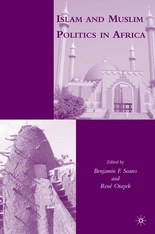|
Reviewed by Donovan Chau, Ph.D., Assistant Professor of Political Science at California State University, San Bernardino The September 11, 2001 (9/11) terrorist attacks on America have become a reference point in the discourse of Islam and its role around the world. American perceptions of Islam in the Middle East were dramatically altered as a result of 9/11, just as the attacks altered perceptions of the Western world from the Middle East. While these issues have been discussed and debated, the same debates and discussions of Islam and its role in sub-Saharan Africa have not occurred. Where is Islam in the African political, economic, and social landscapes? What are the continuities and discontinuities of identification with Islam—and, importantly, why? To what extent is Islam altering African nations and citizens today? Islam and Muslim Politics in Africa, an edited volume by Benjamin F. Soares and René Otayele, offers perspectives that bring us closer to answering questions such as these. Published in 2007, the focus of the volume is the “intersecting dynamics of Islam, society, and the state in sub-Saharan Africa.” The contributors bring a variety of backgrounds and interests—from political scientists to anthropologists to researchers of Muslim societies, Islam, and economics. The volume’s theme is threefold, as outlined in the introduction. First, Islam and Muslim Politics in Africafocuses on modern Islam (or “islam mondain”) and “Muslims’ way of being in the contemporary world.” Building on that idea, it examines “islam mondain” and the Muslims’ way from the perspective of the dynamics internal to African societies, that is to say the local conditions. Moreover, central to the volume’s theme is the desire to correct the “misrepresenting of Islam in sub-Saharan Africa.” Thus, the editors set an ambitious agenda and lay out several assumptions to frame the work as a whole. Foremost among those assumptions is one found in the definition put forth by Soares and Otayele that “Muslim politics” is about “how politics have played out in the lives of Muslims in Africa.” Beyond the formal understanding of politics and even informal arenas of political actions, “Muslim politics” encompasses “the new spaces and opportunities for debate in the public sphere.” This is an important characterization which shapes one’s view of the entire volume. Another assumption is that the conventional way of thinking about Islam and politics in Africa is limited. The conventional approach, according to Soares and Otayele, creates a dichotomy between traditional African Islam (mainly Sufism) and fundamentalist Islamism (mainly Wahabbism). Instead, the editors assume that the practice of Muslims in Africa is changing. While there is a growing demand for Islam, Soares and Otayele assert, the exclusion and marginalization of Islam in the political sphere of Africa has led to “radical solutions.” In addition, the editors assume that Muslims in Africa live in an “era of liberalization,” an idea that generalizes the complex—and very different—political situations in each African country. Some of the assumptions are useful and necessary for bringing coherence to the volume. At the same time, some are unnecessary and unduly prejudice the work as a whole. The idea that there is a conventional view of Islam and politics in Africa is misleading; few understand Islam or Africa. This is not to mention the illiberal nature of many African regimes where Muslims reside. Furthermore, the assumption that exclusion and marginalization of Muslims lead to radical, even violent “solutions” misinterprets militant Islam and misplaces, in some instances, the cause and the effect. What one finds nearly throughout the volume, then, is a tone of anti-Americanism, with particular disdain for former President George W. Bush administration’s approach to combating terrorism. Assumptions are crucial to any sound academic work; yet some of these very assumptions may draw the harshest criticisms from a sound academic. Delving into the thirteen different case study chapters, one finds many positive contributions. By choosing the case study method, from South Africa to Benin to Tanzania, the volume attempts to capture the broadest cross-section of Islam and politics in Africa; and it does so effectively. Two specific chapters stand out. The chapter by Jan Abbink is a careful study of communal relations in the Wallo region of Ethiopia. It provides fascinating historical insight into Islam in Ethiopia, including the successive conversions of Muslims and Christians and their civil interactions. Another chapter by Sanusi Lamido Sanusi explores Islam and politics in northern Nigeria. As with Abbink’s chapter, Sanusi provides a concise historical overview of northern Nigeria and proceeds to examine the “intense politics of religious identity” in one of Africa’s most important countries. All thirteen authors should be commended for examining specific internal dynamics of Islam and politics in a particular African country; such an approach is a powerful tool for understanding Islam and politics in the broader African context. Without a doubt, therefore, the volume contributes to the body of knowledge about Africa, especially as it pertains to the role of Islam on the continent. What one learns from a volume such as this is that Islam is a complex, context-specific force in the African landscape. As in the Middle East, Islam is not a unitary, monolithic force in Africa. Casting it as such is as dangerous as labeling the West as a single, unified entity—neither ever has been nor ever will be. A final, cautionary note must be said about using 9/11 as a point of reference; in Africa and elsewhere, doing so obscures conveniently the details and nuances of the role of Islam, historically and presently. To understand fully the influence of Islam on politics in Africa, one must delve deeply into cases at particular times and in specific places. The historical study of Islam in Africa is the soundest basis from which to interpret the future of Islam and politics in Africa. |


 Islam and Muslim Politics in Africa
Islam and Muslim Politics in Africa